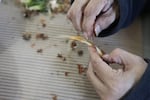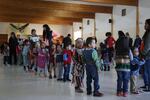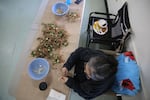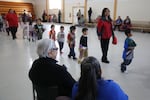Faith communities are grappling with whether to shut their doors in a time of widespread fear and anxiety. Some churches are suspending services, others aren't. On the Warm Springs reservation in Central Oregon, one of the most culturally important rituals of the year continued.
In a community building on the reservation known as a longhouse, different kinds of small green plants foraged from tribal lands were laid out on blankets, their roots to be eaten at a feast Sunday.

Cassie Katchia named six different kinds of roots to be cleaned for a feast, a fraction of the edible plants that historically grew on tribal lands. March 12, 2020.
Emily Cureton / OPB
“It does take about four days to peel all these roots, but we have a big roomful, and we filled that whole room on that side,” said Cassie Katchia, an elder from Warm Springs who sat methodically cleaning each tender white tube by hand.
The preparations and prayers leading up to the Root Feast span five days. The work culminates in ceremonies to give thanks for the start of spring, and the renewal of first food sources like roots, berries and salmon.
But this is no ordinary spring.
Most large events have been canceled to try and stop coronavirus patients from overwhelming the health care system. Health leaders in Warm Springs are part of that effort, but they're not trying to cancel the Root Feast, which typically draws hundreds from far and wide to two longhouses on the reservation.
“It’s part of who we are. If it doesn’t go on, it’s like removing a piece of us. Our culture. Our tradition,” said Caroline Cruz, Warm Springs head of health and human services.
Cruz said she recognizes the public health emergency created by coronavirus: “We know how to mobilize. We’ve been through this. Maybe not to this degree, because this is so unknown.”

Young dancers in Warm Springs perform a mini powwow in the longhouse, as elder women in the adjoining room make preparations for root feast. March 12, 20212
Emily Cureton / OPB
States of emergency are familiar, though. She mentioned a long list — including a global flu pandemic 10 years ago, wildfires, or last year when the reservation’s water system failed.
“We went through a three month, collectively maybe close to six months, water crisis. We didn’t have drinking water. This community mobilized. We dealt with it,” Cruz said.
The threat of fast-moving diseases and social restrictions imposed by the government hold echoes of the past, explained Elizabeth Woody, a historian and author who lives in Warm Springs. She recounted relatives who died in an influenza outbreak a hundred years ago.
“My grandmother lost her brother, her mother. And my grandfather lost all of his siblings except for one, and he lost both of his parents.”

Cassie Katchia works at a table for days to prepare first foods for a feast of gratitude. March 12, 2020
Emily Cureton / OPB
That was 40 years before her birth. At the time, the federal government prohibited many aspects of Native American religion and sacred ceremonies. That wouldn’t change until Woody reached adulthood, when Congress passed the American Indian Religious Freedom Act of 1978.
“And I think that when we have been punished for speaking our language and practicing our religion, people still did it. Some of the elite Indian leaders were dragged behind horses by the U.S. government to stop them from practicing,” she said, taking a long pause. “It’s that important to us, that we probably would die for that freedom."
Woody described religious traditions themselves as a form of survival: “Every person is special. Every person has a voice, every person has a prayer. And ... I don't think we would have survived all of these different events that have diminished our population without that kind of belief in strength."

Elders watch young dancers in a mini powwow at the Warm Springs Agency longhouse on March 12, 2020.
Emily Cureton / OPB
Woody, a former poet laureate of Oregon, called the Root Feast “a deep religious practice,” one that happens when the plants grow, not when people put it in on a calendar. She said whether or not to attend this year is a deeply personal choice.
Woody said she's had to make that choice already, and she won't be able to attend.
“I'm 60 years old and I have health conditions that probably put me at risk if I'm exposed to someone that might be carrying or might be sick with the virus,” she said.
